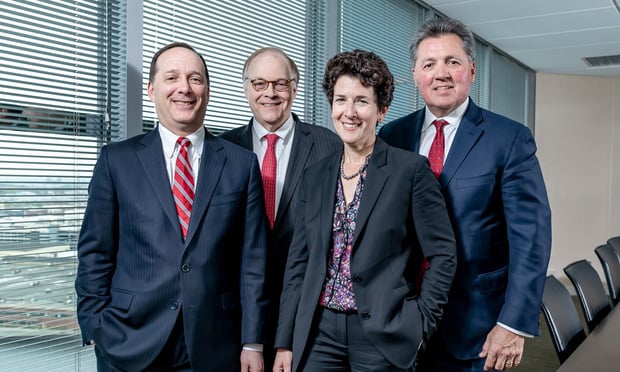Sills Cummis 'Built on a Singular Idea,' Litigation Group Says of Strong 2018
"The firm's litigators relentlessly focus on making a positive impact on the businesses of the firm's clients, not simply winning the case."
May 31, 2019 at 04:32 PM
5 minute read
 From left to right: Richard H. Epstein (Litigation Department Co-Chair); Joseph L. Buckley (Litigation Department Chair); Beth S. Rose (Litigation Department Co-Chair); Joseph B. Fiorenzo (Litigation Department Co-Chair)
From left to right: Richard H. Epstein (Litigation Department Co-Chair); Joseph L. Buckley (Litigation Department Chair); Beth S. Rose (Litigation Department Co-Chair); Joseph B. Fiorenzo (Litigation Department Co-Chair)
The litigation department at Newark-based Sills Cummis & Gross in 2018 handled a mix of important cases in a variety of jurisdictions, at the trial and appellate levels. In addition to the matters mentioned below, the group also represented StarStone Insurance in defense of one of its insureds, inVentiv Health Clinical, in arbitration concerning cancer treatment Multikine that settled; represented Bentley Motors Inc. in a products liability suit in Nassau County, New York, obtaining dismissal based on allegedly threatening correspondence by the plaintiff; and represented a trio of New Jersey municipalities and their residents as class counsel in an action against Ridgewood Water Utility over a water rate increase—a years-long case that last year yielded a judgment in favor of the plaintiffs after a 14-day trial.
** The responses were provided by Joseph L. Buckley, chair of Sills Cummis' litigation department. **
What were some of the department's most satisfying successes of 2018, and why?
2018 was an exciting year for the Sills Cummis & Gross Litigation Department, which again operated at full capacity and continued to try, on average, at least one case per month. The department experienced many satisfying successes for clients in 2018; highlights include the widely covered representation of Third Point LLC as part of its proxy contest for the election of directors to the board of Campbell Soup Co. Working with New York counsel, we filed suit on Third Point's behalf in Superior Court in Camden County, and Peter Verniero argued twice in court before the matter settled, with Third Point successfully placing two of its nominees on the Campbell board and gaining a role in selecting a third director and the hiring of Campbell's CEO. In Montclair State University v. Passaic County et al., Peter Verniero argued in favor of Rutgers University, which appeared as amicus curiae. In its decision, the Supreme Court of New Jersey reaffirmed the qualified immunity from local land use regulations of state universities. The court also specifically recognized the “broadly autonomous” authority of Rutgers in matters of self-governance, including the management of its property. In the U.S. District Court for the Eastern District of Michigan, shortly before trial, the court granted our client M.Z. Berger & Co.'s motion for partial summary judgment, barring plaintiff MY Imagination Inc.'s claim for lost-profits damages of $4.5 million and limiting MY Imagination to nominal damages of $1. Sills Cummis also successfully defended on appeal to the U.S. Court of Appeals for the Second Circuit the District Court's decision in Washington v. Kellwood Co., which had set aside a $4.3 million verdict (more than $9 million with prejudgment interest) for breach of contract against our client Kellwood and awarded nominal damages of $1. In May 2018, the U.S. Supreme Court rejected plaintiff's petition for certiorari.
Being a Litigation Department of the Year means more than providing good counsel. How does your group go a step further for clients?
Founded in 1971, Sills Cummis is a regional powerhouse built on a singular idea—putting the firm's clients first. While we stress to all of our litigators the importance of understanding clients' businesses, our 35 litigation partners in particular make it a priority to understand each client's needs and business objectives, including financial needs, in prosecuting and defending lawsuits. While Sills Cummis is a full-service law firm, litigation has been a bedrock since its founding. From Fortune 500 to emerging growth clients, the firm's litigators relentlessly focus on making a positive impact on the businesses of the firm's clients, not simply winning the case.
Amid a changing market for legal services, what does it mean to be an effective litigator in New Jersey?
Sills Cummis litigators adapt to changing client needs in order to provide the best service possible. To address clients' increasing desire for efficiency and cost certainty, our attorneys have learned to be efficient, and cost-effective, without sacrificing excellence. An effective litigator must also understand e-discovery and the related technology, and we provide ongoing training with respect to this evolving area. Finally, in this Internet age where we are connected 24/7, our litigators understand how frequently and in how much detail each client would like to be kept informed. No two clients—or cases—are alike.
Is it true that clients now more than ever wish to avoid litigation, and if so, how do litigation practices thrive?
No. We have seen a notable increase since the Great Recession in our clients' willingness to prosecute and defend lawsuits and commercial arbitrations.
Litigators are extraordinarily busy people. What does the firm do to ensure that they remain engaged with pro bono work, their communities and their families?
Sills Cummis encourages all attorneys to give back in ways that are meaningful to them. This could entail getting involved with an organization they feel deeply about, mentoring the next generation of litigators, coaching children's sports teams, pro bono legal services, and much more.
This content has been archived. It is available through our partners, LexisNexis® and Bloomberg Law.
To view this content, please continue to their sites.
Not a Lexis Subscriber?
Subscribe Now
Not a Bloomberg Law Subscriber?
Subscribe Now
NOT FOR REPRINT
© 2025 ALM Global, LLC, All Rights Reserved. Request academic re-use from www.copyright.com. All other uses, submit a request to [email protected]. For more information visit Asset & Logo Licensing.
You Might Like
View All
Lack of Jurisdiction Dooms Child Sex Abuse Claim Against Archdiocese of Philadelphia, Says NJ Supreme Court
5 minute read
Loopholes, DNA Collection and Tech: Does Your Consent as a User of a Genealogy Website Override Another Person’s Fourth Amendment Right?
Trending Stories
Who Got The Work
J. Brugh Lower of Gibbons has entered an appearance for industrial equipment supplier Devco Corporation in a pending trademark infringement lawsuit. The suit, accusing the defendant of selling knock-off Graco products, was filed Dec. 18 in New Jersey District Court by Rivkin Radler on behalf of Graco Inc. and Graco Minnesota. The case, assigned to U.S. District Judge Zahid N. Quraishi, is 3:24-cv-11294, Graco Inc. et al v. Devco Corporation.
Who Got The Work
Rebecca Maller-Stein and Kent A. Yalowitz of Arnold & Porter Kaye Scholer have entered their appearances for Hanaco Venture Capital and its executives, Lior Prosor and David Frankel, in a pending securities lawsuit. The action, filed on Dec. 24 in New York Southern District Court by Zell, Aron & Co. on behalf of Goldeneye Advisors, accuses the defendants of negligently and fraudulently managing the plaintiff's $1 million investment. The case, assigned to U.S. District Judge Vernon S. Broderick, is 1:24-cv-09918, Goldeneye Advisors, LLC v. Hanaco Venture Capital, Ltd. et al.
Who Got The Work
Attorneys from A&O Shearman has stepped in as defense counsel for Toronto-Dominion Bank and other defendants in a pending securities class action. The suit, filed Dec. 11 in New York Southern District Court by Bleichmar Fonti & Auld, accuses the defendants of concealing the bank's 'pervasive' deficiencies in regards to its compliance with the Bank Secrecy Act and the quality of its anti-money laundering controls. The case, assigned to U.S. District Judge Arun Subramanian, is 1:24-cv-09445, Gonzalez v. The Toronto-Dominion Bank et al.
Who Got The Work
Crown Castle International, a Pennsylvania company providing shared communications infrastructure, has turned to Luke D. Wolf of Gordon Rees Scully Mansukhani to fend off a pending breach-of-contract lawsuit. The court action, filed Nov. 25 in Michigan Eastern District Court by Hooper Hathaway PC on behalf of The Town Residences LLC, accuses Crown Castle of failing to transfer approximately $30,000 in utility payments from T-Mobile in breach of a roof-top lease and assignment agreement. The case, assigned to U.S. District Judge Susan K. Declercq, is 2:24-cv-13131, The Town Residences LLC v. T-Mobile US, Inc. et al.
Who Got The Work
Wilfred P. Coronato and Daniel M. Schwartz of McCarter & English have stepped in as defense counsel to Electrolux Home Products Inc. in a pending product liability lawsuit. The court action, filed Nov. 26 in New York Eastern District Court by Poulos Lopiccolo PC and Nagel Rice LLP on behalf of David Stern, alleges that the defendant's refrigerators’ drawers and shelving repeatedly break and fall apart within months after purchase. The case, assigned to U.S. District Judge Joan M. Azrack, is 2:24-cv-08204, Stern v. Electrolux Home Products, Inc.
Featured Firms
Law Offices of Gary Martin Hays & Associates, P.C.
(470) 294-1674
Law Offices of Mark E. Salomone
(857) 444-6468
Smith & Hassler
(713) 739-1250








